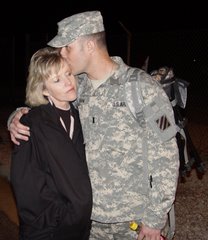Capt. Troy Thomas, commander of the 3rd Squadron, 1st Cavalry Regiment’s Troop A looks into a space that a family of four calls home. The villages of al-Bata and al-Hemidat were destroyed during sectarian fighting in 2005. Thomas is trying to rally support to get the villages rebuilt.
By John Vandiver, Stars and Stripes
Mideast edition, Monday, May 12, 2008
AL-BATA, Iraq — Before the war, Hamid Misshed used to tend to his front-yard garden and mind the crops. Water from the Diyala River fed the fields, and there was peace with his Sunni neighbors next door.
But three years ago, everything changed for Misshed and the 1,200 other people who have called the twin villages of al-Bata and al-Hemidat home for generations.
“In the beginning we refused to leave,” said the 67-year-old, who shouts out his words. “But eventually we had to go.”
In 2005, terrorists descended on al-Bata, home of Sunnis, and al-Hemidat, home of Shiites. Sunni and Shiite extremists quickly went to work. Amid the gunfights, mortars and kidnappings, neighbor turned against neighbor. The villages soon became ghost towns.
“When we first arrived there was no one here. All the residents had fled,” said Capt. Troy Thomas, commander of Troop A, 3rd Squadron, 1st Cavalry Regiment.
The refugees are now starting to trickle back home. Last summer, Troop A soldiers arrived on the scene as part of the “surge” force and started targeting the extremists.
The effort came with a cost. Following one of their first visits to the area, two soldiers were killed on the way out of town by a bomb. But in time the extremists, which included al-Qaida elements, were pushed out, Thomas said.
Once security was established, the local “Sons of Iraq” leader pulled the tribal leaders from both sides together for a reconciliation meeting in September. The sheiks agreed to put the past behind them. By March the first of the villagers started to return.
Getting these two traditionally hostile groups to the negotiating table has been the hallmark feature of Troop A’s work in the ethnically mixed villages just outside of Baghdad’s southeastern city limits.
But it’s not quite a happy ending for the people of al-Bata and al-Hemidat.
When the first of the refugees arrived back home after more than two years away, they discovered a neighborhood reduced to rubble.
“My house is completely ruined. This used to be farmland. Now it’s a desert,” said Amar Jasm, whose family of four recently returned to al-Hemidat.
During his absence, the canals that delivered water from the Diyala River dried out. Now, there is no visible cropland.
Humod Kalil, whose brother was kidnapped and likely murdered during the fighting of 2005, was among the people who also decided to start over again in al-Bata, the larger of the two villages. He now shares his bullet-scarred home with two other families and cares for his orphaned nephew.
“We’re hoping people will come and make things better,” Kalil said.
In the meantime, the families of al-Bata and al-Hemidat live where they can find structures that still have roofs. In some instances that means families squeezing into spaces the size of walk-in closets.
Thomas said coalition forces have been able to help in some ways, such as getting more electricity to the area. A state department-funded vocational program, which is aimed at training Iraqis in construction, is another starting point. The program will teach about 150 people in Troop A’s area how to build. But instead of having people learn how to construct something new, Thomas has steered the program to battered al-Bata and its smaller neighboring village.
“This looks like a pretty good place to learn how the build something,” said Thomas as he guided some Baghdad-based contractors through the decimated villages on a recent visit.
But more money will be needed to get the communities back on track. Perhaps $500,000, Thomas said.
As the soldiers of Troop A prepare to head back home with the rest of the 3rd Heavy Brigade Combat Team, 3rd Infantry Division after a 15-month deployment, it will be up to the incoming 2nd Brigade Combat Team, 1st Armored Division out of Baumholder, Germany, to help finish the job.
Capt. Jamal Williams, commander of the Baumholder-based Company A, Task Force 1-35 Armor, told villagers he would work to bring improvements to the area. But change will not happen overnight, he said.
“I hear your concerns. I need you to give me some time to work on this,” Williams explained to the group huddled around him.
Thomas, who has forged close ties with the local “Sons of Iraq,” says rebuilding the villages will help those local leaders capitalize upon the security gains achieved in the past year.
“This is our northern (area of operation) boundary. We can watch our northern flank from here. To the north is some of the most dangerous territory in Iraq,” Thomas said.
“If you rebuild, you have a ready force in the area,” added Thomas, referring to “Sons of Iraq” security personnel who man checkpoints throughout the region.
In all, about 35 people were killed during the fighting in 2005, villagers said. Roughly 250 of the residents who fled the violence have returned.
Misshed, who leads a family of nine, said he’s not interested in starting over in another town. For 50 years he’s called al-Hemidat home. Pushing 70, he said he wants to work the fields again and get rid of the sand in his front yard.
“This used to be a garden,” said Misshed, pointing at the barren ground.







No comments:
Post a Comment